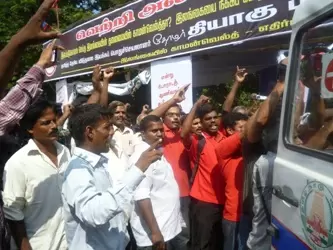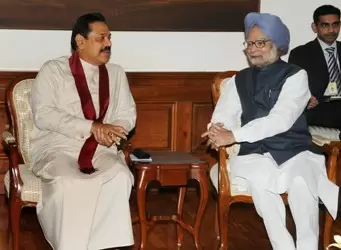A not-so-good year for Rajapakasa and his coterie
11-December-2013

The noose is tightening around President Mahinda Rajapaksa and his racist regime that conducted a genocidal war against the Tamils in 2009. Developments in the last couple of years, especially in recent months, do not bode well for Rajapaksa and his coterie of evil men.
When justice finally catches up with Rajapakasa, history will record these moments for posterity to trace the downfall of the tyrant.
 |
|
Protestors demanding India's boycott of CHOGM 2013 being detained by police in Chennai (File photo)
|
In early 2010, the Permanent People’s Tribunal set the tone at Dublin when it called for an international inquiry against Sri Lanka on the charges of war crimes and genocide.
It was followed by a damning report of the International Crisis Group. The next year a panel of UN Experts stated that at least 40,000 civilians might have lost their lives in the war and recommended a UN inquiry into the conflict.
Charles Petrie’s internal report of the UN estimated the civilian death toll at 70,000. The Bishop of Mannar later gave the accurate figure of 146,679 missing civilians, which the Sri Lankan government has not denied so far.
In a clear indication of the growing impatience of the international community with the Rajapaksa regime, UNHRC passed two humiliating resolutions against Sri Lanka in March 2012 and March 2013.
The students’ movement in Tamil Nadu seeking an independent international inquiry into Sri Lankan war crimes led India to support the resolution in 2013 and also make a strong statement expressing disappointment at the progress made after the war.
Sri Lanka was desperate to get into the good books of the international community. As organizers of the recent Commonwealth Heads of Government Meet (CHOGM), it felt it could clean its blood stained hands and divert international attention from allegations of excessive militarization in the Tamil areas, Sinhalese colonization, harassment of the 90,000 Tamil war widows, lack of rehabilitation of the war affected Tamils and a host of other issues.
One cannot forget the UN human rights chief Navi Pillai’s visit to Sri Lanka in August 2013 and her hard-hitting statement where she expressed deep concern “that Sri Lanka, despite the opportunity provided by the end of the war to construct a new vibrant all-embracing state, is showing signs of heading in an increasingly authoritarian direction."
It sparked off demands for boycott of CHOGM 2013 in many counties. Canadian Prime Minister Stephen Harper delivered the first blow when he announced his decision to boycott the Meet protesting against Colombo’s human rights track record.
Mauritius’ Prime Minister Navin Chandra Ramgoolam followed suit, and stated that the decision to boycott was “taken by a sovereign Mauritius in the face of the absence of progress in Sri Lanka in respect of human rights”.
Bowing to pressure from Tamil Nadu, the Indian Prime Minister Manmohan Singh too stayed away from CHOGM.
Finance Minister P Chidambaram stated at the 2nd South Asian Diaspora Convention in Singapore last month: "I think the Sri Lankan government owes a responsibility and a duty to its own people and the people all over the world to investigate the allegations of human rights violations and punish those who are responsible."
"That's an aspiration or a desire that recognizes no national boundaries. It is a human rights issue," he said.
Though British Prime Minister, David Cameron attended the CHOGM, he made it very clear to the Sri Lankan regime that he meant business and visited the North to get a first hand feel of the post war developments.
He stated categorically after his visit to the Tamil areas, "Let me be very clear, if an investigation is not completed by March, then I will use our position on the UN Human Rights Council to work with the UN Human Rights Commission and call for a full, credible and independent international inquiry.”
The Opposition in Britain does not want to give any breathing space to the Rajapaksa regime. The British labor party has already warned Sri Lanka that 2014 would be a crucial year for accountability in Sri Lanka.
US Assistant Secretary of State for South and Central Asia Nisha Desai Biswal warned recently, “I think that the patience of the international community if real progress is not seen, particularly on issues of accountability, that patience will start to wear thin. And so we urge our friends in Sri Lanka to use the opportunity to show some concrete steps that their own, you know, processes have yielded.”
Among the individuals, many are carrying on a relentless campaign to get justice to the Tamils. The most notable among them is Gordon Weiss, the UN Spokesman during the war, and author of ‘The Cage’, a chilling narrative of the last days of the war.
Benjamin Dixie, a former liason officer of the UN, has started a penning a graphic book titled, ‘The Vanni’, recounting his experiences through the eyes of a victimized Tamil family.
Cullum McRae has been going around the world showcasing the documentary, ‘No Fire Zone’, which depicts the brutal way in which the Sinhala forces targeted the Tamils in the government designated ‘No Fire Zone’ or as they called it, ‘Safe Zones’.
 |
|
Rajapaksa was unable to persuade his friend and Indian Prime Minister Manmohan Singh to attend CHOGM (Photo: Indian Photo Agency)
|
Frances Harrison, who worked in Sri Lanka for the BBC as a journalist has written, ‘Still Counting the Dead: Survivors of Sri Lanka’s Hidden War’. She is producing a documentary on the Tamil Women who had been raped.
Former UN High Commissioner for Human Rights, Louise Arbour has demanded an international inquiry. Nobel laureate, Bishop Desmond Tutu of South Africa along with fellow South African Human Rights campaigner Yasmin Sooka have also voiced the same demand.
Human Rights Watch and Amnesty International are continuing with their campaign for justice for Tamils.
The Tamils world over have demonstrated that they are one up in the game of advocacy and diplomacy and that they are in no mood to relent till they get justice. For Rajapaksa and his coterie this is bad news.
.webp) |
Dr. Paul Newman holds a Doctorate of Philosophy on ‘Internal Displacement and Human Rights situation in Northern Sri Lanka from Bangalore University. He was one of the four public speakers at the Permanent People’s Tribunal on War Crimes against Sri Lanka. He was recently in Mauritius to attend the International Conference on Tamil Diaspora Solidarity organized by the Mauritian Tamil Temple Federation and the International Council for Eelam Tamils.
Order for Health Raises Rs 1 Crore to Expand Healthy Meal Offerings
Teacher Stabbed To Death In Classroom In TN's Thanjavur By Rejected Suitor
Ex-IPS Officer Claims NCP (SP)’s Supriya Sule, Cong’s Nana Patole Involved In Cryptocurrency Scam To Fund Maha Polls
Karnataka Police Kill Top Maoist Leader Vikram Gowda in Encounter
HealthKart Secures $153M Funding to Accelerate Growth








